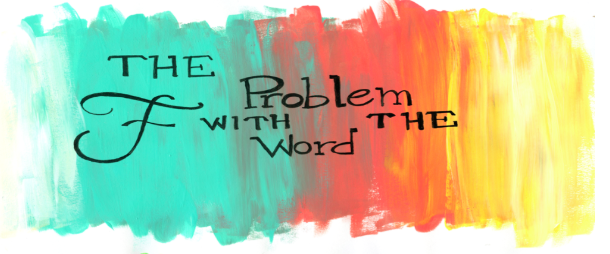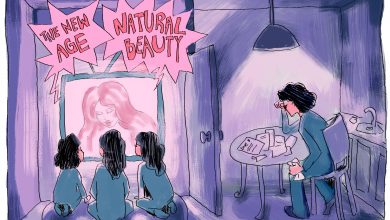The Problem With the “F Word”: Why Humanism Will Not Replace Feminism

I was 11 years old when I first encountered the cynicism and distaste that feminism is often met with.
I was in the computer lab, researching the biography of Dorothy Parker, one of my favorite short story authors, when a classmate leaned over to look at the photo I had pulled up on my screen. Intrigued, she asked me about my subject. I unthinkingly explained that Dorothy Parker was both a short story writer and a quick-witted feminist. She scrunched up her nose at my response. “A feminist?” she said disapprovingly. Her tone said more than her words did. I’ve heard that same tone many times over now, accompanied by various physical signals that express an aversion to the dirty “f word” and the movement associated with it.
But back then I was caught off guard. How was I supposed to respond to such antipathy in reaction to a word that I identified with? My tongue felt twisted and tied — my naïveté caused me to assume that people understood the definition and the history of the word. My inability to respond still bothers me, so here is my belated reply to her and the many other skeptics now:
Feminism isn’t what you think it is. It is not an attack on men, manhood, or masculinity. It is certainly not an attack on femininity. Feminists do not follow a doctrine – we have no scripture, no holy book. Instead, feminists are only linked together by definitions that are similarly vague to the one the Oxford Dictionary supplies, which is that feminism is “the advocacy of women’s rights on the grounds of political, social, and economic equality to men.”
I’ve had many people ask why I consider myself a feminist instead of a humanist. Why, they ask, would you only be for equality for women instead of equality for all human beings? First, let me announce something that should be – but apparently isn’t – obvious. Feminism and humanism are not mutually exclusive. You can be both at the same time and you probably are.
Humanism by definition,
“stress[es] the potential value and goodness of human beings, emphasize[s] common human needs, and seek[s] solely rational ways of solving human problems.”
Remember when I said that the definition of feminism is vague? The definition of humanism is even less specific.
The term “feminism” communicates a relationship to gender, while “humanism” can – and does – refer to any number of things relating to the human condition.
Humanism is similar to white light because in order to form it, pure spectral colors have to be added together. Therefore, without the feminist movement, the civil rights movement, the LGBTQ movement and other focused movements, modern humanism could not exist. How could we respect all humans without first realizing that those with dark skin are human? How could we respect all humans without first realizing that sexual orientation should not affect our respect for an individual? How could we respect all humans without first realizing that women are not worth less than men? Without these “pure colors,” or focused movements, we would not have made the same progress.
Still, there are no clear boundaries between individual human rights movements. Just as each pure spectral color bleeds into the next color, human rights movements interact and support other human rights movements. By validating the experiences of homosexual and bisexual women, the LGBTQ movement helps the feminist cause to gain equality for all women. By critiquing traditional sex roles, the feminist movement legitimizes the needs and desires of those individuals who do not conform to gender expectations. Undeniably, feminism acts as a force of equality. While Intersectional Feminism understands how different identities shape a woman’s experiences, the feminist movement as a whole has been successful in large part because of its focus.
That is why upholding humanism as a more inclusive version of feminism is shortsighted. Not only does Intersectional Feminism already consider multiple characteristics but Humanism is a philosophy that encomposses a wide range of ideas and movements, which would cause the need to fight for women’s causes to be drowned out by similarly urgent voices.
Feminism itself has so many different waves, voices, and flavors that at times they even conflict with each other. It is difficult to maneuver between the perspectives of blogger Anita Sarkeesian, radical activist Gloria Steinem, writer David Futrelle, and the French philosopher and writer Simone de Beauvoir. While each feminist voice adds a unique perspective to the discussion, a person trying to gain a comprehensive view of feminism might become easily confused from such a large collection of ideologies. Renaming the feminist movement the humanist movement would only exacerbate this problem.
But people still ask, isn’t the term “feminist” outdated? Don’t women have equality in this day and age – and if it’s true that feminists want equality for all genders in all arenas, then why does the term not reflect that? I’d say yes, the main focus of feminism is on attaining equality for all women, partially because of the historical disparities between how women and men were treated. And while the lives of women – particularly in the Western world – have improved, there is still some stagnation and even decline in the fight for gender equality.
The pay gap between men and women still exists; women lack representation in Washington DC; women make up less than 5% of Fortune 500 companies; all women still experience harassment; women in the Gaming industry, like Anita Sarkeesian and Zoe Quinn, receive death threats and rape threats; and female health rights, such as birth control and abortion, are under attack.
More than that, feminists do want to free all genders from societal expectations because we care about the individual. Actually, three people managed to compile a 2½-page list of feminist articles speaking on male and transgender rights in less than 15 minutes on the website Brute Reason, which illustrates how prevalent male and transgender issues are within the feminist movement.
“Humanism” isn’t enough on its own. We need feminism to focus our efforts and to specifically strive for gender equality, so I won’t abandon my status as a feminist. That would be unnecessary and detrimental. Instead, I hope that feminists everywhere can bring awareness to how feminism has positively shaped the world.




